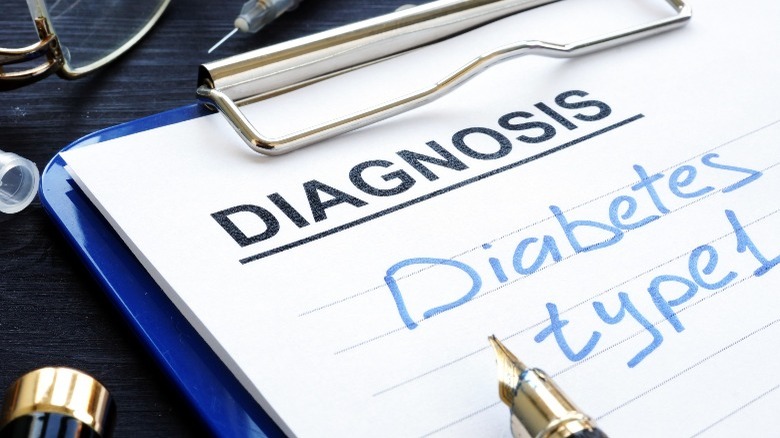FDA Takes A Big Step Forward With Medication To Help Slow Down Type 1 Diabetes
According to the Centers for Disease Control and Prevention (CDC), diabetes is a disease that impacts the body's hormone production. After you eat food, the body breaks down and delivers glucose into the bloodstream, which in turn brings up levels of blood sugar via the pancreas's release of the hormone insulin. Insulin plays a role in making sugar available to use for energy, says Cleveland Clinic. If your body generates insufficient amounts of insulin, or cannot properly regulate blood sugar levels with insulin, then you may have diabetes. You may have heard of two types of chronic diabetes. Type 2 diabetes occurs when the body cannot properly regulate blood sugar levels due to inefficient use of insulin. Type 1 diabetes happens when the body does not make enough insulin. It is also classified as an autoimmune disease.
Type 1 diabetes may have more extreme symptoms that onset faster (via Mayo Clinic). Symptoms can include — but are not limited to — a frequent need to urinate, blurred vision, feelings of thirst, tiredness, weakness, or even shifts in your mood. While those living with type 1 diabetes may develop symptoms at any point in their life, it usually begins as a youth. A recent breakthrough drug approved by the United States Food and Drug Administration (FDA) may help delay the onset of type 1 diabetes. Here's everything you need to know.
Can this medication help slow down type 1 diabetes?
According to the FDA, those living with type 1 diabetes need either shots of insulins or an insulin pump to stay alive. Recently, the FDA approved a first-of-its-kind drug that could delay the onset of type 1 diabetes (stage 3) in adults and type 1 diabetes (stage 2) in children ages 8 or older. The new drug, brand name Tzield, could delay the onset of the aforementioned stages of type 1 diabetes for months or years. CNN reports that clinical trials showed that the drug delayed the onset of the advanced stages of type 1 diabetes by just over 24 months. Tzield, the monoclonal antibody teplizumab, is given during a 30-minute session over 14 days in a row (via USA Today). The preventative drug is estimated to cost a total of $193,000 and could be available before the start of the new year.
The FDA specifies that the drug is given intravenously by way of an infusion. There are possible side effects of the drug, which also has several warnings. Side effects can include a rash, headache, and even lower counts of select white blood cells. There are several warnings that include — but are not limited to — symptoms of cytokine release syndrome, increased risk of severe infection, and lower counts of lymphocytes, a type of white blood cell.


